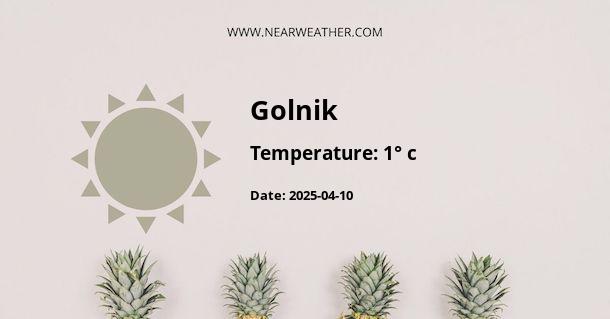Understanding the Climate and Weather Patterns in Golnik, Slovenia
Golnik is a small settlement located in the historical region of Upper Carniola in Slovenia, characterized by a temperate climate with distinct variations across seasons. Here, we'll delve into the intricacies of Golnik’s climate, including seasonal normals, precipitation patterns, and how topography influences local weather. By examining meteorological data and expert analyses, we'll provide comprehensive insight into what one can expect weather-wise in Golnik year-round.
Geographic and Topographic Influence
Golnik lies at an approximate altitude of 478 meters above sea level, nestled in the Slovenian Alps foothills which significantly shape its climate. This proximity to the Alps contributes to a greater propensity for variable weather conditions and local microclimates.
"Golnik, like many alpine settlements, experiences a diverse range of climate conditions due to its complex topography. Its location can lead to pronounced weather events, including föhn winds contributing to rapid temperature fluctuations," notes a local climatologist.
Seasonal Climate Overview
Winter
- Average temperatures: Range from -5°C to 5°C.
- Precipitation: Peak snowfall typically occurs between December and February.
- Snow cover: Can be expected with higher frequency and is often influenced by altitude.
| Month | Average High (°C) | Average Low (°C) | Precipitation (mm) |
|---|---|---|---|
| December | 0 | -6 | 89 |
| January | -1 | -7 | 80 |
| February | 2 | -5 | 76 |
"Winter sports enthusiasts can revel in Golnik's winter offerings. However, the unpredictable alpine weather demands careful planning and adherence to weather advisories," advises a local ski resort manager.
Spring
- Average temperatures: Typically rise steadily from March to May.
- Precipitation: Increases through spring, with May being the wettest month.
Spring in Golnik is marked by the melting of snow and the gradual greening of the landscape. However, late frost events can occur due to the region's elevation and proximity to the mountains.
Summer
- Average temperatures: Can reach up to 25°C in hotter months.
- Precipitation: Summer storms are common with high rainfall in short periods.
The summer climate is generally warm and pleasant, with longer daylight hours favoring outdoor activities. Nevertheless, the region sees occasional summer storms induced by the complex interaction between valley and mountain climates.
Fall
- Average temperatures: Cool down progressively, making for a crisp autumn weather.
- Precipitation: Rainfall is moderate compared to spring and summer, but can intensify during October.
Autumn brings about a vibrant display of foliage colors, with cooler temperatures and a noticeable decrease in tourist activities. Additionally, the likelihood of early snowfall increases as winter approaches, particularly at higher altitudes.
Year-Round Weather Patterns and Events
Local weather events can have profound influences on daily life in Golnik. Heavy snowfall during winter often leads to a sudden influx of tourists seeking winter recreational activities, while thunderstorms in summer pose challenges for those engaged in agriculture and tourism.
"We observe a yearly pattern where the demands for energy and infrastructure adapt swiftly to the evolving weather, from snow-clearance in winter to storm-preparation in summer," remarks a municipal official from the region.
Climate Adaptation and Recommendations
For those planning to visit or live in Golnik, it is crucial to consider the following:
- Winter preparedness should include warm clothing, snow tires, and an awareness of avalanche risks.
- Spring and summer outdoor activities can be disrupted by inclement weather, making rain gear and contingency plans essential.
- Autumn can be unpredictable with occasional early winters, thus layering and weather-appropriate attire is recommended.
"Those partaking in outdoor activities in Golnik must remain keenly aware of fast-changing weather patterns and take appropriate precautions,” emphasizes a local mountain guide.
Long-term Climate Considerations
Research indicates that climate change is impacting weather predictability worldwide and Golnik is no exception. Data reveals trends of increasing temperatures, shifting precipitation patterns, and altered timing of seasons—all factors that could have a lasting impact on the region's environmental and socio-economic landscape.
| Aspect | Current Trend | Potential Impact |
|---|---|---|
| Temperature Increase | Gradual Yearly Rise | Alteration of Growing Seasons |
| Precipitation Variability | More Intense and Less Predictable | Increased Flood Risk |
| Seasonal Shift | Earlier Springs, Later Autumns | Impacts on Wildlife and Vegetation |
In conclusion, Golnik’s climate and weather are shaped by various factors including its alpine location, topography, and global climate trends. Visitors and residents must stay informed about current weather conditions while also considering the broader implications of long-term climatic changes. The interplay between accurate forecasting and adaptive measures is crucial in maintaining Golnik's natural beauty and the safety of its inhabitants.
A - Golnik's Latitude is 46.333328 & Longitude is 14.333330.
A - Weather in Golnik is 1° today.
A - Climate Conditions in Golnik shows fog today.
A - Humidity in Golnik is 100% today.
A - Wind speed in Golnik is 0 km/h. today.
